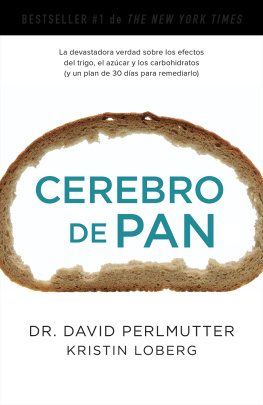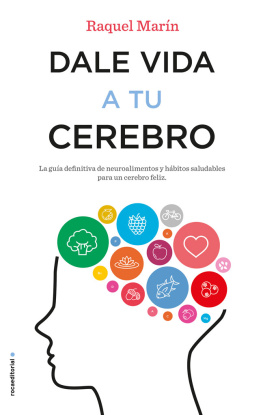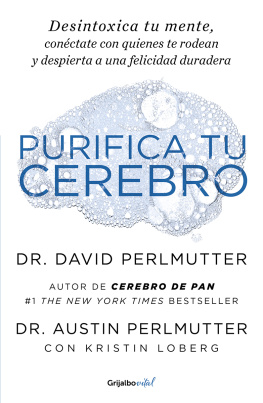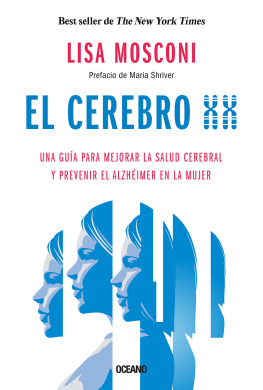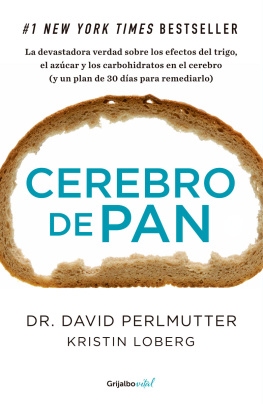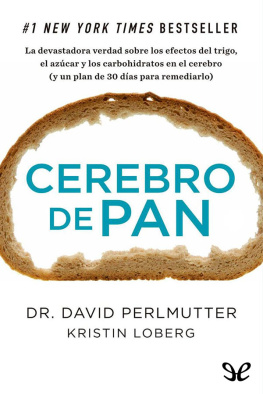
NOTAS
A continuación hay una lista de libros y artículos científicos que puedes considerar útiles para aprender más sobre algunas de las ideas y los conceptos expresados en este libro. Este material también puede abrir la puerta a futuras investigaciones e indagaciones. Para acceder a más estudios y a una lista de referencias que se actualiza con regularidad, te invito a visitar www.drperlmutter.com.
Introducción
MetLife Foundation, “What America Thinks: MetLife Foundation Alzheimer’s Survey”, estudio conducido por Harris Interactive en febrero de 2011: https://www.metlife.com/assets/cao/foundation/alzheimers-2011.pdf (visitado el 13 de febrero de 2013).
Annie L. Culver et al., “Statin Use and Risk of Diabetes Mellitus in Postmenopausal Women in the Women’s Health Initiative”, Archives of Internal Medicine 172, 2 (2012), pp. 144-152.
Åsa Blomström et al., “Maternal Antibodies to Dietary Antigens and Risk for Nonaffective Psychosis in Offspring”, American Journal of Psychiatry 169, 6 (2012), pp. 625-632.
Capítulo 1
Eric Steen et al., “Impaired Insulin and Insulin-like Growth Factor Expression and Signaling Mechanisms in Alzheimer’s Disease — Is This Type 3 Diabetes?”, Journal of Alzheimer’s Disease 7, 1 (2005), pp. 63-80.
R. O. Roberts et al., “Relative Intake of Macronutrients Impacts Risk of Mild Cognitive Impairment or Dementia”, Journal of Alzheimer’s Disease 32, 2 (2012), pp. 329-339.
http://www.doctoroz.com/videos/alzheimers-diabetes-brain.
Mark Bittman, “Is Alzheimer’s Type 3 Diabetes?”, The New York Times, 25 de septiembre de 2012: http://opinionator.blogs.nytimes.com/2012/09/25/bittman‑is‑alzheimers-type‑3‑diabetes/ (visitado el 15 de octubre de 2012). El artículo de Bittman proporciona una muy buena explicación sobre la diabetes tipo 3.
http://www.diabetes.webmd.com (visitado el 13 de mayo de 2013).
http://aiafoundation.org/patients-families/facts-figures/.
http://www.rhodeislandhospital.org/wtn/Page.asp?PageID =WTN 000249.
Bittman, “Is Alzheimer’s Type 3 Diabetes?” (véase el capítulo 1, nota 4).
http://www.cdc.gov/mmwr/preview/mmwrhtml/mm6145a4.htm (visitado el 13 de mayo de 2013).
http://www.framinghamheartstudy.org.
Penelope K. Elias et al., “Serum Cholesterol and Cognitive Performance in the Framingham Heart Study”, Psychosomatic Medicine 67, 1 (2005), pp. 24-30.
Nicolas Cherbuin et al., “Higher Normal Fasting Plasma Glucose Is Associated with Hippocampal Atrophy: The PAT H Study”, Neurology 79, 10 (septiembre de 2012), pp. 1019-1026; doi: 10.1212/WNL.0b013e31826846de.
http://www.sciencedaily.com/releases/2012/09/120904095856.htm (visitado el 13 de mayo de 2013).
Walter F. Stewart et al., “Risk of Alzheimer’s Disease and Duration of nsaid Use”, Neurology 48, 3 (marzo de 1997), pp. 626-632.
Angelika D. Wahner et al., “Nonsteroidal Anti-inflammatory Drugs May Protect Against Parkinson’s Disease”, Neurology 69, 19 (6 de noviembre de 2007), pp. 1836-1842.
José Miguel Rubio-Pérez et al., “A Review: Inflammatory Process in Alzheimer’s Disease, Role of Cytokines”, Scientific World Journal (1° de abril de 2012), doi: 10.1100/2012/756357.
William Davis, Wheat Belly, Nueva York, Rodale Books, 2011.
Capítulo 2
Keith O’Brien, “Should We All Go Gluten-free?”, The New York Times, 25 de noviembre de 2011: http://www.nytimes.com/2011/11/27/magazine/Should‑We-All‑Go‑Gluten-Free.html?pagewanted=all (visitado el 10 de septiembre de 2012).
Chris Chase, “Is Novak Djokovic’s New, Gluten-free Diet Behind His Win Streak?”, Yahoo! Sports, 17 de mayo de 2011: http://sports.yahoo.com/tennis/blog/busted_racquet/post/Is‑Novak-Djokovic-8217‑s‑new-gluten-free-diet-?urn=ten-wp706 (visitado el 10 de septiembre de 2012).
Para una excelente revisión de las definiciones básicas de gluten y sus efectos en el cuerpo, visite la biblioteca de recursos en: http://www.healthspringholistic.com.
http://healthspringholistic.com.
David Perlmutter, “Gluten Sensitivity and the Impact on the Brain,” en: http://www.huffingtonpost.com/dr‑david-perlmuttermd/gluten-impacts-the-brain_b_785901.html (visitado el 21 de noviembre de 2010).
David Perlmutter y Alberto Villoldo, Power Up Your Brain: The Neuroscience of Enlightenment, Nueva York, Hay House, 2011.
El doctor Alessio Fasano, del Centro Boston para el Tratamiento e Investigación de la Celiaquía, que forma parte del Hospital General de Massachusetts, ha escrito ampliamente sobre la sensibilidad al gluten y las numerosas maneras en que se manifiesta en la gente, a veces imitando a otros desórdenes. Puedes visitar su sitio web y acceder a sus publicaciones en: http://www.celiaccenter. org/.
Marios Hadjivassiliou et al., “Does Cryptic Gluten Sensitivity Play a Part in Neurological Illness?”, Lancet 347, 8998 (10 de febrero de 1996), pp. 369-371.
Marios Hadjivassiliou et al., “Gluten Sensitivity as a Neurological Illness”, Journal of Neurology, Neurosurgery and Psychiatry 72, 5 (mayo de 2002), pp. 560-563.
Bernadette Kalman y Thomas H. Brannagan III, “Neurological Manifestations of Gluten Sensitivity,” en Neuroimmunology in Clinical Practice, Wiley-Blackwell, 2007. Este libro proporciona una excelente revisión de la historia de la celiaquía.
Marios Hadjivassiliou et al., “Gluten Sensitivity: From Gut to Brain”, Lancet Neurology 9, 3 (marzo de 2010), pp. 318-330. Este artículo proporciona otro maravilloso panorama de la celiaquía a través de los tiempos.
T. William et al., “Cognitive Impairment and Celiac Disease”, Archives of Neurology 63, 10 (octubre de 2006), pp. 1440-1446. Véase también Mayo Clinic, “Mayo Clinic Discovers Potential Link Between Celiac Disease and Cognitive Decline”, Science-Daily, 12 de octubre de 2006: http://www.sciencedaily.com/releases/2006/10/061010022602.htm (visitado el 11 de marzo de 2013).
Hadjivassiliou et al., “Gluten Sensitivity: From Gut to Brain” (véase capítulo 2, nota 11).
El siguiente sitio web es una entrada al trabajo y las publicaciones del doctor Vojdani: http://www.yourmedicaldetective.com/public/148.cfm.
Rodney P. Ford, “The Gluten Syndrome: A Neurological Disease”, Medical Hypotheses 73, 3 (septiembre de 2009), pp. 438-440.
Gianna Ferretti et al., “Celiac Disease, Inflammation and Oxidative Damage: A Nutrigenetic Approach”, Nutrients 4, 4 (abril de 2012), pp. 243–257.
Idem.
http://www.healthspringholistic.com.
Christine Zioudrou et al., “Opioid Peptides Derived from Food Proteins (The Exorphins)”, Journal of Biological Chemistry 254, 7 (10 de abril de 1979), pp. 2446-2449.
Davis, Wheat Belly (véase capítulo 1, nota 17).
http://www.healthspringholistic.com.
Capítulo 3
Craig Weller, http://www.barefootfts.com.
Roberts et al., “Relative Intake of Macronutrients Impacts Risk of Mild Cognitive Impairment or Dementia” (véase capítulo 1, nota 2).
M. Mulder et al., “Reduced Levels of Cholesterol, Phospholipids, and Fatty Acids in Cerebrospinal Fluid of Alzheimer Disease Patients Are Not Related to Apolipoprotein E4”, Alzheimer Disease and Associated Disorders 12, 3 (septiembre de 1998), pp. 198-203.
P. Barberger-Gateau et al., “Dietary Patterns and Risk of Dementia: The Three-city Cohort Study”, Neurology 69, 20 (13 de noviembre de 2007), pp. 1921-1930.
P. M. Kris-Etherton et al., “Polyunsaturated Fatty Acids in the Food Chain in the United States”, American Journal of Clinical Nutrition 71, 1 (enero de 2000), pp. S179-S188. Véase también: http://chriskresser.com/how-too-much-omega‑6‑and-not-enoughomega‑3‑is-making‑us‑sick.
Página siguiente
